- Home
- Andrew Wareham
Dire Shenanigans (The Making of a Man Series, Book 2) Page 4
Dire Shenanigans (The Making of a Man Series, Book 2) Read online
Page 4
The Old Man was inclined to be horrified – it would take little imagination to see one of his destroyed business rivals doing the same for him. He preferred English ways, he found.
“You know that your wife died, Richard?”
“I was informed, sir. Strictly speaking I should be in blacks for her, but I really cannot be doing with that!”
“Nor should you! Her funeral was private and almost unattended – her father and one other from the family, his heir, I believe. Sufficient!”
Sir Godby led Dick into the house to a glass of wine, Briggs quietly serving them and showing no expression whatsoever at Dick’s presence.
“Tell me, Richard, what of this business you are in now?”
Dick explained the patent medicine trade, making no attempt to hide the role of opium and alcohol in appeasing the upsets of the middle-aged lady.
“It works, sir, to the extent that those who take the medicine feel far more comfortable for it. I suspect very few physicians can offer anything better. From the business point of view, of course, the lady who buys a bottle a week for as long as a month will be a customer for the remainder of her life. I am in process of forming a limited company under the new Act for the purpose of raising the capital to build a far larger factory and to buy in greater quantities of our raw materials at source. That I could sell three and four times as much as at present seems a certainty, and that in the Lancashire area alone.”
“Would it not be cheaper to have factories located around the country rather than transport heavy glass bottles hundreds of miles by rail?”
“A factory in London and another in the West Country; a third in Leeds or Sheffield, perhaps, and a last in Glasgow or Edinburgh or thereabouts, you would suggest, sir?”
“Producing on licence, perhaps? Paying you, say thruppence on each pint sold. Geographical boundaries firmly fixed so that they cannot pirate customers from each other.”
By the time they sought their beds they had roughed out an agreement giving the Old Man London and all the land south of the Thames and as far as Bristol, he to build and run two factories and to expand sales as he could. The need for aristocratic directors was broached and dealt with – Lord Carteret had dabbled in more than one speculation put his way by Sir Godby, and had profited greatly; he would certainly lend his name.
“Yours as well, of course, sir. You are, after all, unknown on the Manchester Exchange!”
Sir Godby had recently bought a farm – they were cheap these days, he said, agriculture being in a slump. He took Dick on an inspection of his acres.
“It’s what they call a Home Farm, Richard, producing mostly for the table at Burke’s. There is an excess quite frequently, and that goes down to the market in Poole – always a call for fruit and vegetables there. Not quite worth putting it on a train to London.”
“New to you, I presume, sir, the rural existence?”
The Old Man stared at him for a few seconds then shrugged; the boy had a right to know.
“No. I grew up on a dirt farm out in the backwoods in Poland. The Cossacks came every few years, sent by the Tsar to keep the Jews down; I was fifteen when I hit one with a felling axe when he grabbed hold of my little sister. I doubt it did her any good – they would have found his body and razed the whole village in retaliation, but I had run before that. I took his pistols – you aren’t the only one to have used a handgun, boy! I shot a little local nobleman in his coach two days later and pocketed the few coins he had and made my way to the Prussian border, picking up what I could on the way. I took passage out of Hamburg and landed in Newcastle with a hundred or so to my name. Bought a bit and dealt a bit and worked my way south over a couple of years, ended up in Poole with a thousand in my purse. Then I made my way up in the merchanting world, the hard way.”
“Well done, sir! I have had it easier in every respect. How many acres have you here?”
“Three hundred. Hillside for the cattle, bottom land for the crops. Pigs and chicken around the farmhouse itself.”
“Pigs?”
“If there is a god I don’t see he’s going to give a damn what you eat, boy. If he hasn’t got better things than that to worry about then he ain’t much use!”
“My opinion too, sir, in common with most of our countrymen. Not the case in America, mind you – you’ll see six churches there for every one you come across in this country, and most of them full!”
“Don’t stop them killing each other, does it, my son! Will you go back to their war?”
“I may, sir. Not entirely in my hands.”
They dined in solitary state each evening – the County did not visit at Burke’s, there were no other guests. The food was good and the wines, to Dick’s limited knowledge, more than adequate; he had no objections to the lack of genteel company, it enabled them to talk freely.
“I happened to come across a little gold-mining company recently, Father. Intending to mine in the new colony of Nigeria, so it says. On the Manchester Exchange – probably because the merchant houses in Liverpool have most to do with the African coast. Nothing to do with it myself, of course, but I could perhaps put would-be investors into contact with the firm’s representative in England. It says it will be offering very high returns.”
“Have you bought any of its shares?”
“Good God, no, sir! Nor should you, but you might have a rich acquaintance who could come to hear about them. There is an intention to offer the opportunity to participate in a very substantial loan as well; at very high rates, of course. You might be able to disclose the name of an agent who could be convinced of the value to his client of such an investment.”
The Old Man laughed – shares might be new outside of banks and railways, but he could feel a fraud when it was in the offing.
“You feel that my lord owes you something, Richard?”
“Not at all, sir – this is purely in the spirit of revenge – no greed at all!”
By the end of the visit they had agreed that Sir Godby’s own broker would not be informed of the existence of the company – a speculative venture, after all. Sir Godby would, however, consult another, younger man, and he might be paid to pass the information on as far as Carteret’s man, all in a highly confidential fashion, never a name to surface.
“African gold – my lord will love it! He will buy the shares, no doubt about it, Richard. You are certain that you can distance yourself from the affair?”
“Who, me, sir? I have never heard of the company or seen any of its promoters. No more has anyone else, of course!”
“Very wise. What do you intend to do with the money?”
“Buy silks and brandy, mostly, sir, to transmit to Washington. There is already a shortage of luxury items for the rich, and a plethora of wealthy speculators wanting to buy such things. The last letter from my partner in business there demanded a showing of medical goods – of the opium pill and of injectable morphine particularly – and a bulk of profit-making fripperies in the next consignments to New York.”
“What of armaments for their war?”
“No, sir, not now, they will be manufacturing their own in vast quantities in the North, and the South will probably capture all they need on the field of battle in the East. Great guns, perhaps, sir – heavy field pieces may well be in short supply, but there will be little demand for other weapons.”
“So… there is little scope for investment in the American trade, you suggest.”
“Not unless you have a partner in Washington who can move fancy goods for you.”
“What would you advise me to do with a few thousands sitting idle in New York at the moment?”
“Buy up wheat lands in the West, sir. The railroads are spreading and more land is coming under the plough and the demand for bread in England is insatiable. Land prices are very low just now, because men are being pulled away from the plough and sent to war. Despatch an agent to the States, a trusted man, and take up fields wherever they become available. Buy in t
he North, sir, because land titles in the South may become very shaky when they have lost this war. If you buy I can put you in contact with a few gentlemen in the West who will be able to manage your land for you. They will be honest, as well. Within reason, that is, one might not wish to audit any business man’s books to the last penny, after all.”
“Must the Confederacy lose?”
“Of course – they lack every sinew of war; they are short of men; the North must defeat them in the end. The North lacks only a general, and they will find one, some day.”
“Will the Union have the guts to continue the fight to the bitter end, Richard?”
“Lincoln will. If Honest Abe loses the next election then the succeeding President will probably negotiate a peace. If it should be McClellan then that peace will be a betrayal – he has no concept of democracy and freedom. It will destroy America, because he will have no respect for industry and the States will become a nation of backward pastoralists who will inevitably come into conflict with Mexico again, and quite probably lose.”
“I am surprised our government does not seek to undermine Lincoln then.”
“Nothing a government does will surprise me, sir.”
On reaching Liverpool Dick found a letter waiting, a request that he might wend his way south to London, there to make contact with Major Hewitt. He spent a day at the business, mostly discovering from Mr Robinson just how his latest tonic was progressing.
“There has been a slight setback, I fear me, Mr Burke. It seemed to me that the mixture for the relief of consumption might be reinforced by the addition of an amount of foxglove tea – digitalis – to strengthen the faltering heart so common to the declining unfortunate.”
Robinson fell silent and Dick was forced to prompt him.
“Rather sadly, the subjects of the experiment found the reinforcement to be too vigorous for their weakened constitutions to bear.”
“They suffered heart attacks, in fact?”
“Regrettably, yes, sir.”
“Has this led to any problems with the authorities, Mr Robinson?”
“Well, no, Mr Burke – what has such a matter to do with ‘authorities’?”
“In that case, Mr Robinson, we must progress – the march of science must continue!”
“I agree, sir! I have in fact added a little of the herb sage to the latest mixture, while removing the foxglove, of course. The flavour is much enhanced, I believe – a very healthy taste! I am considering an amount of dried dandelion root as well – I remember my old grandmother swearing by it before she died.”
“There is much to be said for a herbal tonic, I believe, Mr Robinson. I presume the base will continue to be opium and alcohol?”
Robinson confirmed that to be so – one must have strong background constituents for the suspension, he said.
Dick had not the least idea what that might mean, but he was no medical genius, he consoled himself. He left for the train to London.
Town stank, as always, and was covered by a filthy brown fog, a ‘London Peculiar’, when he stepped down at the terminus.
The hotel manager sympathised with his expressions of disgust.
“Cholera and typhoid both rife in the East End this year, Mr Burke. There is a programme of sewer-building afoot, but it will be many years before that has any effect. For the while, sir, be assured that the hotel sterilises all of the water here – you may wash yourself in safety!”
He would only drink tea – made with boiled water – or bottled alcohols, so was safe otherwise. It was a dangerous city in many respects, particularly for country folk who stayed in lesser hotels and boarding-houses and had no natural immunity to London’s poisons.
There was a message from Major Hewitt and Dick discovered that he was to pay a visit at an office in Whitehall. Visibility in the street was less than fifty yards; it would be impossible for a stranger to make his way on foot and cabs were not to be seen.
“One of our boys will lead you, Mr Burke, and wait for your return.”
Major Hewitt greeted Dick courteously and took him through to another office. A few minutes wait and they were joined by a very senior gentleman, judging by his age and appearance; he did not introduce himself.
“Information from the Eastern Seaboard suggests that a series of battles have taken place outside Richmond, Mr Burke. The whole occurring over some seven days, one understands.”
“Were the casualties very high, sir?”
“Substantial, it is believed. The official reports have yet to emerge. You do not ask of the victor, sir.”
“McClellan expected the South to fall back, to allow him tactical occupation of the ground. He did not wish to fight and must therefore have effectively been attacked or have been held at a fortification he was unaware of. The South will have chosen their ground and their time – they have far the better fighting generals – and will, I must imagine, have won a comfortable victory.”
“Exactly so, sir. The Union forces are withdrawing, other than a token garrison to hold the original landing place. The word we have is that General McClellan was not present on the fields of battle, that he withdrew to the comfort and safety of a gunboat in the river, there to guide proceedings from a distance!”
“To be expected, sir. I remember him being critical of Lord Cardigan for being at the front of his great charge and thus unable to exercise tactical control of his regiments. McClellan made the point that a general has a lot more to offer than a strong right arm. He is, of course, at least partly correct in that. But the Duke of Wellington was always present at his battles, immediately behind the line, able to see almost all that occurred and respond immediately while, I have no doubt, McClellan will have needed the strongest of telescopes to see anything at all!”
They noticed the absence of courtesy – a very bald ‘McClellan’ with no title at all.
“You have told me that he is not a coward, Mr Burke.”
“Physically, no, he is not, sir. Morally? Who is to say?”
“Could HM Government trust him, Mr Burke?”
The unknown put the question bluntly, the first time he had opened his mouth.
“No, sir. He would enter into any agreement with the absolute intent of keeping it, but adverse circumstances would have an immediate effect. He would, incidentally, expect you to understand that the fault was not his – he was forced into unpleasant actions that he much regretted. Circumstances had changed and therefore his pledged word could no longer have effect.”
“Ah… One of that sort!”
They said no more of McClellan – there was no need.
“We have word of a battle in the West, at Shiloh. Two days of combat, the Union defeated on the first and then returning to drive the South off the field. A General Grant the commander, a man who has already achieved a degree of success on the Mississippi.”
Dick had heard of Grant - all of McClellan's possible rivals had been discussed in detail.
“A man with a chequered past, sir. He is said by some to be a hopeless drunk. Others admire his iron will and refusal to accept defeat – as would sound to be the case in this battle.”
The pair of Londoners exchanged nods, some decision taken; the older man stood and made a polite farewell.
“Names are unnecessary, of course, Mr Burke, but I can say that you have the approval of the government. You are requested - and I emphasise that this is in no way an order – to take an early passage to the States and then to make your way to the Mississippi, there to place yourself in a position to observe the doings of General Grant. The embassy in Washington will have instructions to send you as an observer to the scene – it is quite a normal procedure and you will be able to suggest that you are to report on the use of the rifle in modern warfare, for the benefit of the British Army. We wish to know whether General Grant will be a successful leader in war and later in peace, that is all.”
A request – all very well, but a wise man would not wish to refuse his government.
<
br /> “How soon, Major Hewitt?”
“Leaving England within the month?”
“Difficult, but not impossible. I have business interests that must be put in the hands of trusted agents – who must, of course, be discovered.”
“I am sure you will be able to do so, Mr Burke. There will be a degree of compensation, of course – a lump sum payable on your return which will not be ungenerous. And, besides, one never knows – you might discover another gold mine in the States!”
Rather an unsubtle threat, Dick thought; they obviously had him under a sort of surveillance, and were unconcerned by any malfeasance on his part. They were concerned to own him, that was all. It could be useful – any prying policeman might well be told to run away and play elsewhere.
“If I might advise you, Mr Burke? Go as a man who intends to settle in the States – one who has returned to England and has discovered that he no longer belongs there – you will find much sympathy to that attitude. Your tickets will be paid for, if you will but send a letter to me informing me of the ship and date of passage. First Class, of course!”
“How do I report, Major Hewitt?”
"To the Embassy in the first instance – merely to inform them of your arrival on the scene and then to give an inside view of any battles you observe. Your more important observations you will make in person in London, next year perhaps.”
Mr Robinson was much distressed that Mr Burke found he must return to the States, wondered what was to become of the firm.
"All will proceed as normal, Mr Robinson. I will ensure that you have nothing to fear, sir."
Easily said.
Dick sat to think, reluctantly found only one possible course. He took the train south again, arriving at Burke's unheralded by letter.

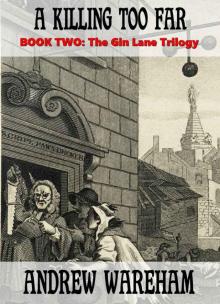 A Killing Too Far
A Killing Too Far Killing's Reward
Killing's Reward A New Place
A New Place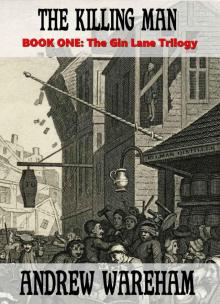 The Killing Man
The Killing Man Bold and Blooded
Bold and Blooded The Breaking Storm (Innocent No More Series, Book 2)
The Breaking Storm (Innocent No More Series, Book 2) Nobody’s Child
Nobody’s Child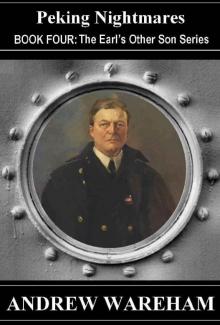 04 Peking Nightmares (The Earl’s Other Son Series, #4)
04 Peking Nightmares (The Earl’s Other Son Series, #4)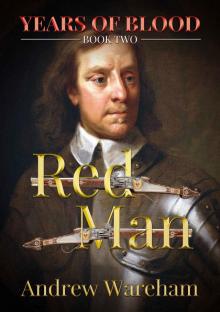 Red Man
Red Man Foreign Mud
Foreign Mud The Gathering Clouds (Innocent No More Series, Book 1)
The Gathering Clouds (Innocent No More Series, Book 1) 06 A Soldier’s Farewell (Man of Conflict #6)
06 A Soldier’s Farewell (Man of Conflict #6)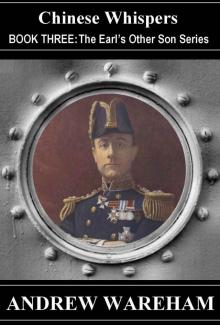 Chinese Whispers
Chinese Whispers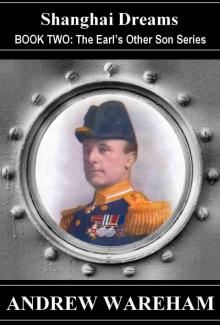 02 Shanghai Dreams (The Earl’s Other Son #2)
02 Shanghai Dreams (The Earl’s Other Son #2)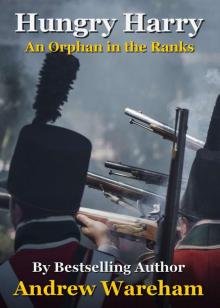 Hungry Harry: An Orphan in the Ranks
Hungry Harry: An Orphan in the Ranks A Wretched Victory (Innocents At War Series, Book 6)
A Wretched Victory (Innocents At War Series, Book 6)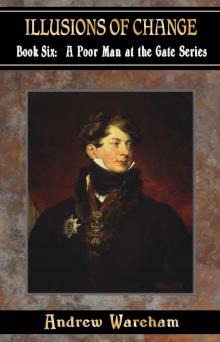 Illusions Of Change (A Poor Man at the Gate Series Book 6)
Illusions Of Change (A Poor Man at the Gate Series Book 6) The Wages Of Virtue (A Poor Man at the Gate Series, Book 8)
The Wages Of Virtue (A Poor Man at the Gate Series, Book 8) Blood and Famine (Man of Conflict Series, Book 4)
Blood and Famine (Man of Conflict Series, Book 4) The Friendly Sea (The Duty and Destiny Series, Book 1)
The Friendly Sea (The Duty and Destiny Series, Book 1)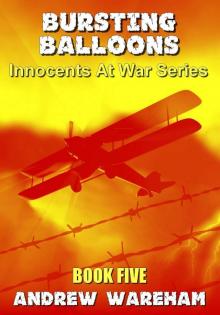 Bursting Balloons (Innocents At War Series, Book 5)
Bursting Balloons (Innocents At War Series, Book 5)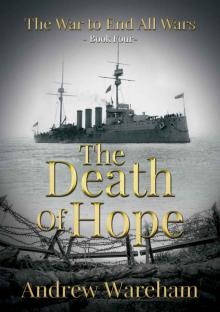 The Death of Hope
The Death of Hope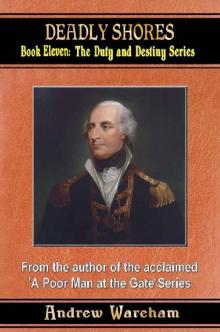 Deadly Shores (The Duty and Destiny Series, Book 11)
Deadly Shores (The Duty and Destiny Series, Book 11) The Vice Of Virtue (A Poor Man At The Gate Series Book 10)
The Vice Of Virtue (A Poor Man At The Gate Series Book 10) Virtue’s Reward (A Poor Man at the Gate Series, Book 11)
Virtue’s Reward (A Poor Man at the Gate Series, Book 11)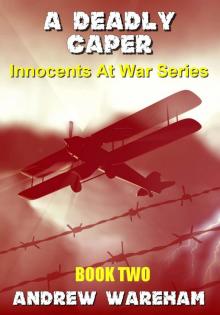 A Deadly Caper (Innocents At War Series, Book 2)
A Deadly Caper (Innocents At War Series, Book 2)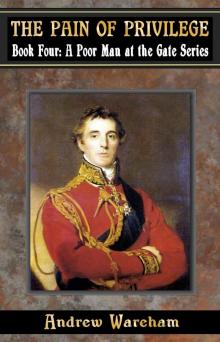 The Pain Of Privilege (A Poor Man at the Gate Series Book 4)
The Pain Of Privilege (A Poor Man at the Gate Series Book 4)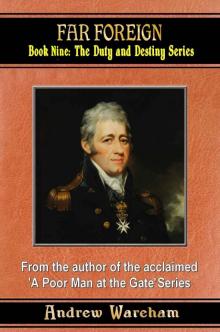 Far Foreign (The Duty and Destiny Series, Book 9)
Far Foreign (The Duty and Destiny Series, Book 9)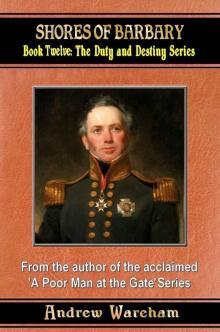 Shores of Barbary (The Duty and Destiny Series, Book 12)
Shores of Barbary (The Duty and Destiny Series, Book 12)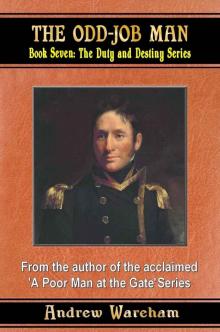 The Odd-Job Man (The Duty and Destiny Series, Book 7)
The Odd-Job Man (The Duty and Destiny Series, Book 7) Fire and Folly (Man of Conflict Series Book 3)
Fire and Folly (Man of Conflict Series Book 3) A Victorian Gent (The Making of a Man Series, Book 1)
A Victorian Gent (The Making of a Man Series, Book 1)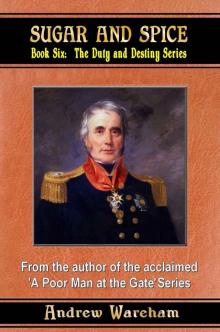 Sugar and Spice (The Duty and Destiny Series, Book 6)
Sugar and Spice (The Duty and Destiny Series, Book 6) Dark Days Of Summer (Innocents At War Series, Book 4)
Dark Days Of Summer (Innocents At War Series, Book 4) Dire Shenanigans (The Making of a Man Series, Book 2)
Dire Shenanigans (The Making of a Man Series, Book 2)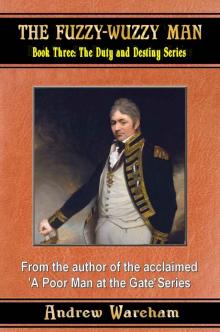 The Fuzzy-Wuzzy Man (The Duty and Destiny Series, Book 3)
The Fuzzy-Wuzzy Man (The Duty and Destiny Series, Book 3) Privilege Preserved (A Poor Man at the Gate Series Book 5)
Privilege Preserved (A Poor Man at the Gate Series Book 5)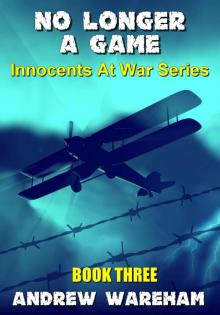 No Longer A Game (Innocents At War Series, Book 3)
No Longer A Game (Innocents At War Series, Book 3)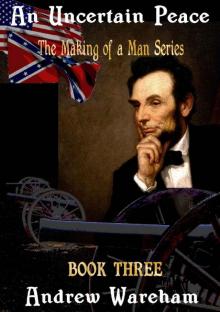 An Uncertain Peace (The Making of a Man Series, Book 3)
An Uncertain Peace (The Making of a Man Series, Book 3)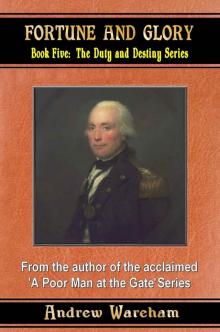 Fortune And Glory (The Duty and Destiny Series, Book 5)
Fortune And Glory (The Duty and Destiny Series, Book 5) The Old Order (A Poor Man at the Gate Series Book 7)
The Old Order (A Poor Man at the Gate Series Book 7) A Place Called Home (Cannibal Country Trilogy, Book 2)
A Place Called Home (Cannibal Country Trilogy, Book 2) Nouveau Riche (A Poor Man at the Gate Series, Book 2)
Nouveau Riche (A Poor Man at the Gate Series, Book 2) The Privateersman (A Poor Man at the Gate Series Book 1)
The Privateersman (A Poor Man at the Gate Series Book 1) Britannia’s Son (The Duty and Destiny Series, Book 4)
Britannia’s Son (The Duty and Destiny Series, Book 4) Long Way Place (Cannibal Country Trilogy, Book 1)
Long Way Place (Cannibal Country Trilogy, Book 1) Spanish Tricks (Man of Conflict Series, Book 5)
Spanish Tricks (Man of Conflict Series, Book 5) A Parade Of Virtue (A Poor Man At The Gate Series Book 9)
A Parade Of Virtue (A Poor Man At The Gate Series Book 9)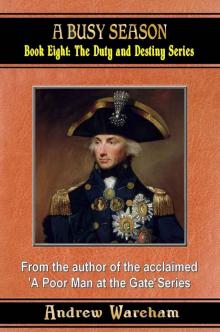 A Busy Season (The Duty and Destiny Series, Book 8)
A Busy Season (The Duty and Destiny Series, Book 8) Billy Bacon and the Soldier Slaves (Colonial Warrior Series, Book 1)
Billy Bacon and the Soldier Slaves (Colonial Warrior Series, Book 1) Raging Rajahs (Man of Conflict Series, Book 2)
Raging Rajahs (Man of Conflict Series, Book 2)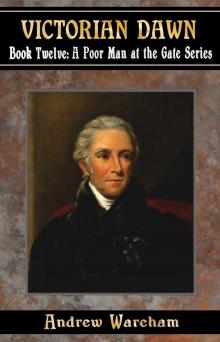 Victorian Dawn (A Poor Man at the Gate Series, Book 12)
Victorian Dawn (A Poor Man at the Gate Series, Book 12) Born To Privilege (A Poor Man at the Gate Series Book 3)
Born To Privilege (A Poor Man at the Gate Series Book 3) The Soldier Brat (Man of Conflict Series, Book 1)
The Soldier Brat (Man of Conflict Series, Book 1)